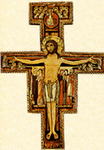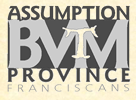Flu, Finances, Foreclosures, Fanatics, Farenheit -- Franciscans?
We certainly are living in "interesting times", as the fabled ancient Chin ese curse puts it. Just read today that a huge section of the Anarctic ice shelf is breaking off leaving the glaciers more exposed to the ocean, which can increase their melting speed. As of today almost 170 people have died in Mexico due to the so-called "swine flu." The economic stimulus seems sluggish and US auto makers are in a very bad way. And Somali pirates in the Indian Ocean and Taliban militants in Pakistan and Afghanistan are upping the violence, plus the sectarian inter-Muslim violence spree in Baghdad, Iraq has taken scores of lives.
ese curse puts it. Just read today that a huge section of the Anarctic ice shelf is breaking off leaving the glaciers more exposed to the ocean, which can increase their melting speed. As of today almost 170 people have died in Mexico due to the so-called "swine flu." The economic stimulus seems sluggish and US auto makers are in a very bad way. And Somali pirates in the Indian Ocean and Taliban militants in Pakistan and Afghanistan are upping the violence, plus the sectarian inter-Muslim violence spree in Baghdad, Iraq has taken scores of lives.
I remember back in high school, my best friend who is now deceased, an evangelical Christian, talked to me about his faith often and provoked my Catholic faith by quoting the great American Baptist Evangelist, Rev. Billy Graham (whether this quote originated with him, I don't know): "If you were arrested for being a Christian, would there be enough evidence to convict you?"

Currency of the USA "In God we Trust?"
This is a question that every Christian, I think, needs to ponder. Certainly it is one that we Franciscans must address! And address it we are -- Franciscan men and women, young and old, throughout the world. For instance, just this past year (2008), the Franciscan friars began a mission outreach among refugees in Darfur, that part of Sudan (eastern Africa) which has witnessed untold violence and repression. Franciscans -- men and women -- are advocating for deliberate and profound positive responses, often "green" responses, to the growing global warming concerns (e.g. Antarctic ice shelf melting).
Perhaps what we as Christians, and as Franciscans in particular, can offer is hope. It is certainly what we are proclaiming this Easter Season with our cry of "Christ is Risen! Indeed he is Risen!"
Maybe this really is our opportunity to shine. The candles we lit during the Easter Vigil, all lit from the Paschal Candle, the candles that the newly baptized held, the newly confirmed clung to -- isn't this all about hope? Not a "hope" that any political leader can elicit or proclaim. It is the singular hope of those who believe -- who have encountered -- Jesus is risen from the dead!
How about choosing hope, the kind that led St. Francis of Assisi way back 800 years ago or so to ask the Lord Jesus in prayer, "Lord, what do you want me to do?"













































